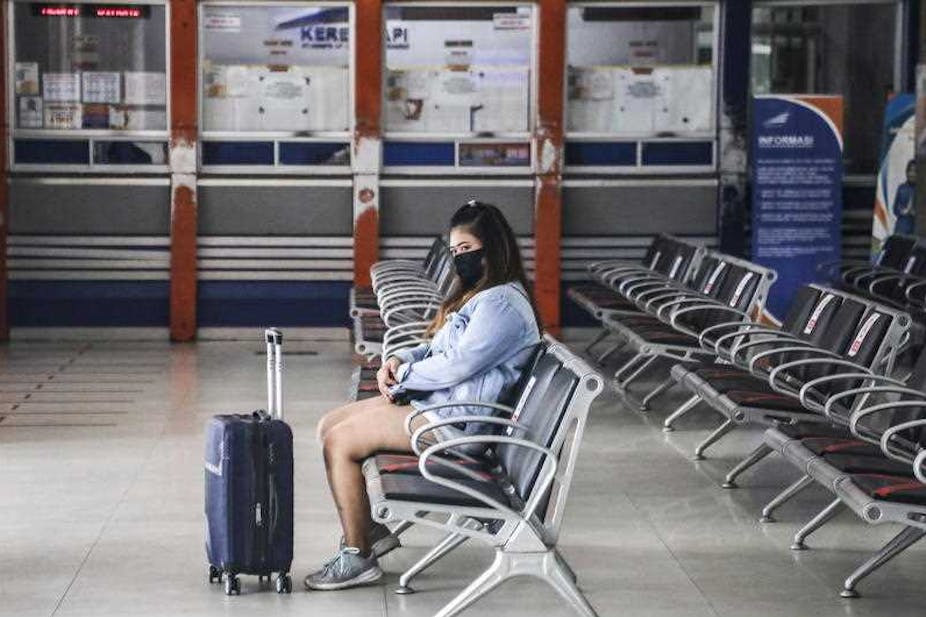COVID-19 has hit Indonesia hard.
The country now has the highest death toll in Southeast Asia just a few weeks after declaring itself “virus-free”. Some experts predict COVID-19 will infect 70,000 Indonesians as of Ramadan and Eid, a time when millions of the country’s Muslims typically travel to their home towns.
Amid this situation, China, which has managed to get its COVID-19 cases to zero and is a strong partner of Indonesia, sent 40 tons of medical aid to Indonesia. The aid includes disposable masks, N-95 masks, protective clothing, goggles, gloves, shoe covers, infrared thermometers and surgical caps.
In a phone call with President Joko “Jokowi” Widodo, Chinese President Xi Jinping reiterated China’s commitment to help Indonesia fight the pandemic.
While such goodwill is appreciated, China should expand its assistance to Indonesia by also sending experienced medical staff and testing technology, as well as sharing more of the lessons learned from managing an effective total lockdown as in the case of Wuhan.
If China hopes to protect its economic interest in Southeast Asia’s largest economy and improve its global image, it should help Indonesia during this pandemic.
Economic reasons
China faces a daunting task revitalising its economy. It is up against serious structural challenges, including declining growth, high unemployment, growing debts and increased poverty, among others.
Some time after COVID-19 hit Wuhan, the country’s economy appears to be improving, but analysts continue to slash their financial forecasts. A V-shaped rebound is not detected any time soon.

With the United States and Europe both reeling from the pandemic, Chinese exports are expected to take a big hit.
Indonesia, the largest market in Southeast Asia, can be one of the partners that can help fix this. China is the largest source of imports to Indonesia with a value of US$34.3 billion. It is also Indonesia’s largest export destination.
Moreover, for China, Indonesia’s strategic location offers a gateway to the wider ASEAN market. Beijing’s strategic rivalry with Washington should move China to ensure it has friends in neighbouring regions.
Another reason for China to help Indonesia is that all major Chinese investment projects in Indonesia have been suspended due to coronavirus.
Among these projects are the US$1.63 billion Morowali Industrial Park in Sulawesi and the US$5.5 billion Jakarta-Bandung fast-train project. The suspension is mostly because many Chinese workers are not able to return to Indonesia and because the Indonesian government has asked people to stay home.
The Belt and Road Initiative (BRI) is crucial to fix various economic problems within China and is expected to be completed by 2049. But the initiative could face further delays if the COVID-19 pandemic in countries along the BRI routes, including Indonesia, continues or even worsens.
Improving China’s global image
China’s image has been damaged globally due to a widespread perception that the virus is “coming from China” or was caused by increased Chinese presence, especially their workers.
This is also happening in Indonesia. Like Donald Trump, some Indonesians can be found using the term “China virus” to refer to COVID-19.
A London-based conservative think-tank, the Henry Jackson Society, has compiled its “Coronavirus Compensation?” report, which argues: “China should be sued under international law for trillions of dollars for its initial cover-up of the coronavirus pandemic which has caused more than 60,000 deaths and trillions of dollars in economic damage.”
Some in Indonesia have even begun discussing the allegation, arguing that Indonesia should join this move along with countries such as India.
Providing help to Indonesia could be a way for China to change the current narrative and save its image in the country.
It may not be easy, though, with anti-Chinese sentiment deeply entrenched in Indonesia. However, by helping Indonesia to deal with the COVID-19 pandemic, China could at least minimise the sentiment.

Health assistance will add to China’s agendas in the education and cultural sectors to extend its soft power in the country.
Indonesia needs it
The COVID-19 situation in Indonesia shows it needs a helping hand from other countries, including China.
With the virus having spread to almost all provinces, Indonesia’s handling of COVID-19 has been haphazard. At first, Indonesia denied the gravity of the outbreak. Now, with millions of people at risk, it does not have the best facilities to treat infected people.
As other countries imposed social-distancing measures to narrow the spread of the coronavirus-imposed lockdown, Indonesia was reluctant to do so until a few weeks ago due to economic considerations.
What makes it worse is that the country has limited medical facilities and staff to manage the virus patients.
Medical personnel have been complaining about the lack of equipment not only for coronavirus patients but also for the staff who must treat patients daily.
Five medical personnel associations have threatened to reject COVID-19 patients if the government does not guarantee the availability of personal protective equipment.
This situation is made worse by the shortage of medical personnel ready to treat COVID-19 patients. The government has not provided training for these medical personnel.
At the same time, Indonesia is still unable to accurately identify individuals infected by the virus. This is shown by frequent differences in data between the central government and regional governments on the number of coronavirus-affected individuals.
Struggling Indonesia seems to need help and China, a country that has managed to suppress COVID-19 infections and has huge economic interests in Indonesia, should provide assistance.
Dimas Rizki Permadi, a Universitas Islam Indonesia graduate, co-authored this article.


